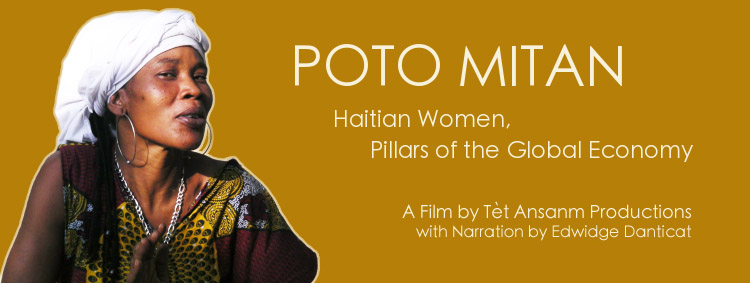“Poto Mitan brings honor and respect to the women who have been the true backbone of Haiti. In conditions of despair, they bring hope to a people by their efforts and well-reasoned arguments, by their keen intelligence, and their undaunted spirit.”

he first and only successful slave revolt leading to free nationhood, Haiti has a tradition of collectivism and activism. Despite this strength of the culture that includes a vibrant tradition of music, art, literature, dance, and spirituality, Haiti has become the economically poorest country in the hemisphere. Haiti’s descent is a result of collusion between elites and the state on the one hand, and the inequality of the world system.
When Haiti won its independence in 1804, permanently ending slavery, they were isolated by the slaveholding world around them. Several U.S. presidents, for example, owned slaves. France, who lost their most profitable colony in 1804, demanded Haiti pay 150 million francs in 1825 as a condition of their recognition of Haiti’s independence - to pay former slave owners for their loss of “property.” Light-skinned president Boyer accepted but couldn’t pay, so Haiti took out a loan from a private French bank. While this sum was reduced, this independence debt - the only instance in world poscolonial history - took as much as 80% of the government revenue for almost a century to pay off. While Europe and North America was developing infrastructure, Haiti’s resouces were being drained to pay this debt.
In 1915, U.S. Marines landed on Haiti’s shores and occupied the country for 19 years. The U.s. installed a constitution that F.D.R. claims to have written personally that opened up Haiti for foreign ownership of land for the first time. The U.S. also installed a modern army, that propped up the 29-year Duvalier dictatorship. The international community fed the Duvalier dictatorship with millions of dollars in aid, with much from the U.S. who needed an ally in the Cold War, especially following the Cuban Revolution. When “Baby Doc” Duvalier was flown out of Haiti aboard a U.S. plane on February 7, 1986, Haiti’s creditors - the World Bank, IMF, and Inter-American Development Bank and others - decided to force Haiti’s people to pay for Duvalier’s debt.
Currently Haiti’s debt is estimated at 1.7 billion dollars, much of it accumulated by dictators before the first democratic election in 1990. Haiti pays $1 million per week in debt service - more than its budget for health care, education, infrastructure, or agriculture. Since February 29, 2004, when president Aristide was forced out, Haiti has been under foreign occupation. It is estimated that the U.N. mission - MINUSTAH - spent $600 million in 2008, dwarfing Haiti’s budget for development. As a result of this long-term mistreatment of Haiti at the hands of foreign instit tions and elite groups, Haiti is now the poorest country in the hemisphere. Half of Haiti’s people live under $1 per day, and fully 80 percent of people live under $2 per day. One in eight children die before their fifth birthday, and - while major strides have been made - around half of people can't read or write. In April 2008, Hait’s food crisis - kriz lavi che a - finally got world attention following a series ofprotests.
As seen, Haiti’s contemporary political and economic crisis has multiple roots. Haiti’s people, the poor majority, have been excluded from power. Given Haiti’s extreme poverty and the world labor market, Haitian workers’ wages are among the lowest anywhere. At its peak, the export processing industry employed 80,000 Haitians, but current estimates are 20,000 at best. With few other choices, a job making $1.75 per day producing clothes for the U.S. has very many applicants. At any given moment, “50,000 people are behind you” competing for your job. In this context, workers are intimidated against speaking out to demand that their rights are respected and scared to join unions.In Haiti, as elsewhere, poverty and income inequality intersect with gender inequality. Women bear the brunt of this neoliberal globalization. But Haitian women are organized in their effort to change things, and women have respect in the country, referred to as pillars of the family, the community and society. Women are “poto mitan.”



